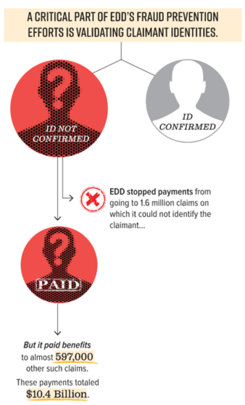Expansion of unemployment programs and the easing of some eligibility requirements under the CARES Act have led to increased fraud – especially identity theft. Some people who would not have normally been eligible to receive regular unemployment benefits became eligible for Pandemic Unemployment Assistance (PUA). In addition, U.S. Department of Labor rules allowed people to receive benefits prior to their filing claims.
SCAM ALERT: The Department of Justice has issued a warning about websites that look like unemployment benefits sites but are fake and designed to trick you into disclosing personal information.
In California, the Employment Development Department (EDD), which administers the state’s Unemployment Insurance (UI) program, reported that in February 2020 unemployment surged from 4.3% to 16.2%. The EDD received around 2.4 million claims in April 2020, about 13 times as many as it received in April 2019.
The California State Auditor found that the massive increase in claims may have made the EDD’s fraud detection efforts more difficult. While the EDD did stop approximately $12.8 billion in potentially fraudulent payments, it also approved almost 597,000 claims totaling $10.4 billion in payments that might have been fraudulent. The total approved claims represented about 10% of all processed unemployment claims. The State Auditor also found that, because of the overwhelming increase in claims, the EDD approved possibly fraudulent claims while legitimate claims weren’t processed.
Some of the EDD’s actions that allowed the fraudulent claims were:
- Allowing people to collect benefits even though they were using suspicious addresses – in one case more than 1,700 claims came from the same address. One person reported receiving 65 pieces of mail from EDD for at least 15 different people.
- Allowing claims under names of people in prison for approximately $810 million.
- Not being prepared to assist victims whose personal information had been used to file fraudulent claims.
Credit: California State Auditor
In Kentucky, the Kentucky State Auditor found similar challenges impacting unemployment claims. The number of unemployment claims in March 2020 alone was more than 162,000. Other issues in the unemployment insurance program identified by the Kentucky State Auditor:
- The Office of Unemployment Insurance (OUI) implemented an “auto-pay” program that paid UI benefits to claimants. Claimants did not have to submit information normally required to indicate eligibility for benefits, so while not all of these claims were necessarily improper, the environment for possible fraud increased.
- Due to the number of claims, many were not processed in a timely manner. As of October 2020, the claims backlog consisted of 80,000 unprocessed requests. Additionally, OUI had archived more than 400,000 emails to its UI assistance email account that remained unread as of November 9, 2020.
The U.S. Department of Labor has identified unemployment insurance fraud across the country. For example, in January 2021, California reported it paid at least 10 percent ($11 billion) of its UI benefits to fraudulent claims since the beginning of the pandemic and believes the amount could be as high as 27 percent ($29 billion). Other states have also reported instances of major fraud including New York ($1 billion), Washington ($600 million), Kansas ($600 million), and Maryland ($501 million).
The U.S. Department of Justice has established the National Unemployment Insurance Fraud Task Force to investigate unemployment insurance fraud schemes across the country. The Task Force has found that bad actors are stealing identities and using them to file fraudulent claims for UI benefits. If you have filed a lawful UI claim and received a notice that your claim was rejected because a claim was already received under your name, you could be a victim of identity theft.
If you believe you have been a victim of identity theft, you can file a report with your state unemployment benefits agency. Also, visit IdentityTheft.gov for more information on unemployment insurance fraud and report identity theft to the Federal Trade Commission. The Internal Revenue Service also has information for you on identity theft related to unemployment benefits.
Read the full reports by the California State Auditor, the Kansas Legislative Post Auditor, and the U.S. Department of Labor’s Inspector General.


